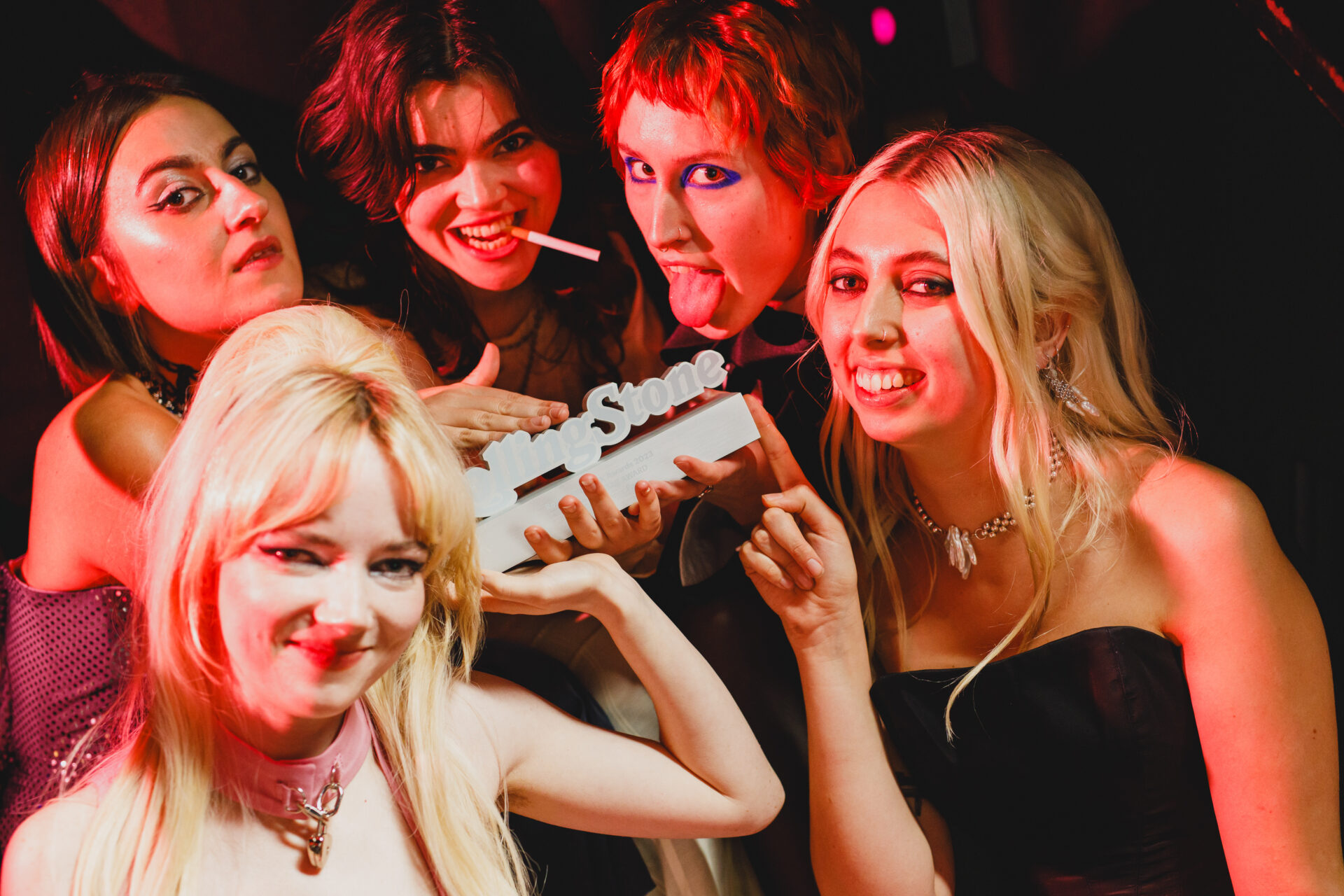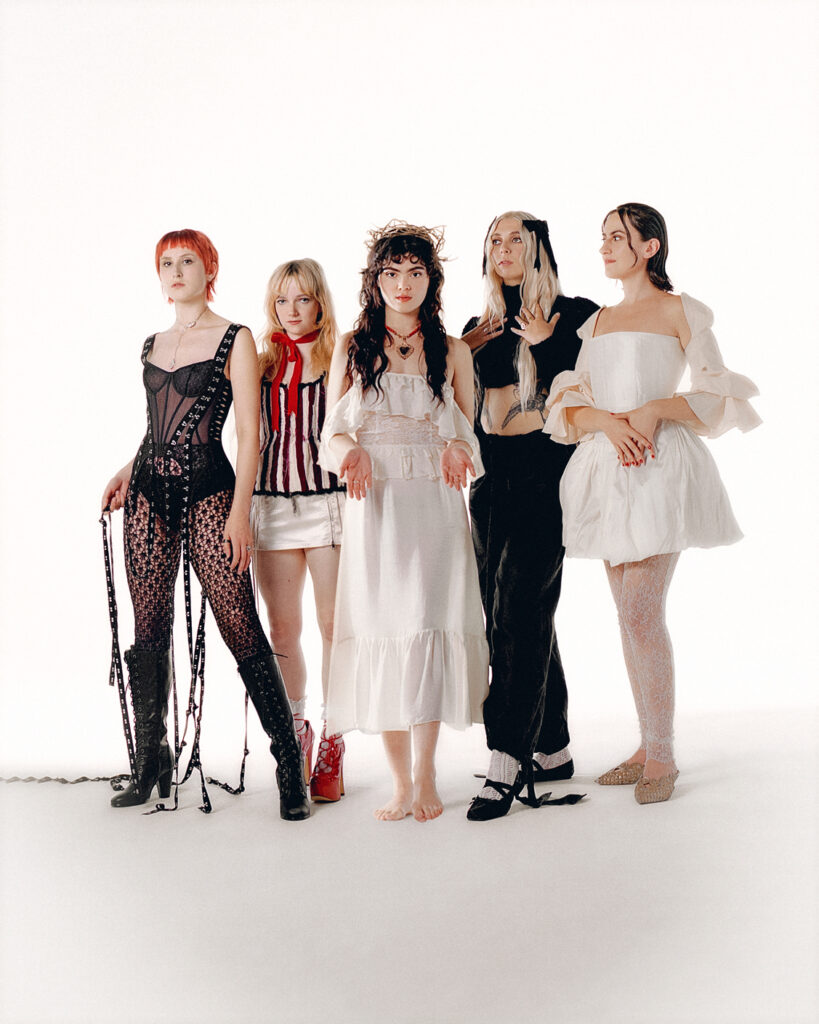How The Last Dinner Party became the band on everyone’s lips in 2023
Last week saw The Last Dinner Party win the Rising Star Award at the Rolling Stone UK Awards in collaboration with Remy Martin. We take a look at their breakout year and 2024 - which promises their debut album and biggest gig yet.

The Last Dinner Party knew what they wanted to be from the very start. When I meet the band before the second of their two gigs at Hackney’s EartH venue, under their orders, a line of fans in distinctive fancy dress has already emerged out front. The five-piece, who have been a band for four years but playing gigs for only two of those, have a command over — and dialogue with — their audience of the kind that most artists never achieve in their entire careers. From a word-of-mouth success to becoming 2023’s most exciting new band — and winners of The Rising Star Award, supported by Moving Venue — they enter 2024 as a group with the world at their feet.
Before even having their first rehearsal together as a band, the five members — vocalist Abigail Morris, guitarists Lizzie Mayland and Emily Roberts, bassist Georgia Davies and keys player Aurora Nischevi — had already pinned down a defined aesthetic for the project, which they viewed as just as important as the music. For their first gig at The George Tavern in London in November 2021, they gave themselves a dress code (Princess Diana in an American Apparel advert) and emerged as a fully formed audio-visual experience.
“I wanted to start out strong by establishing what we’re about,” Morris tells me in the EartH dressing room ahead of the second show. “We’re going to dress up, we’re going to have themed shows — it’s going to be more than just people standing and playing, and we’re gonna act like we’re doing something on a much larger scale.”
Rewind two years from the gig at The George, and the band had already amassed a host of songs since forming in 2019 but had delayed performing live because of their aversion to the idea of seated or distanced lockdown performances. “I remember saying to you guys, ‘Let’s not do a gig until people can stand up,’” Davies recalls. “‘I don’t want to play to a roomful of people with masks, six feet away from each other.’”
“It was frustrating at the time but kind of a blessing,” Morris adds. “It meant we had so much time to really come out fully formed.” When the band did emerge with such a defined style and an arsenal of fleshed-out material, some in the music industry raised eyebrows as to their origins. Unlike many bands who evolve and change from scrappy beginners with half-formed ideas into something more complete, The Last Dinner Party were ahead of the game from the beginning. Far from being a cynical marketing exercise, it was the marker of a band with a crystal-clear artistic vision and the bravery to take their time until they were ready.
“We never really put pressure on ourselves to record stuff,” Davies says. “That was always a secondary priority to playing live. We really admire those bands who you never heard anything from until you saw them live, the old-school way of doing it.”

The most prominent example of this in recent memory is Black Midi, who were hailed as the most exciting new band in the UK before they even released debut single ‘bmbmbm’ in the summer of 2019. In a truly rare phenomenon in the internet age, bootleg recordings of their gigs at the Brixton Windmill were passed around like a furtive secret. You actually had to see them live. “I managed to get a CD demo that they’d left in a kebab shop!” says Davies, laughing. “They said, ‘OK, you can hear our music, but you have to go to this kebab shop in east London!’ I showed up like, ‘Can I have a Black Midi and some chips please?!’”
Taking cues from this anti-internet approach to launching a band, Morris adds: “There was a big period where the normal thing that an artist would do is put out music on their own before even playing a live show, and the fans would come from TikTok or YouTube. Now, people are just really hungry for live bands, live performances and finding something in the real world.”
At the EartH show, it’s immediately clear why the band had such an aversion to the idea of a seated or Covid-distanced gig; their live performance hinges on sweaty connection and the breaking down of barriers. Their fans — who rabidly adhere to dress codes which have thus far included Folk Horror, Velvet Goldmine, A Night at the Opera and more — know the unreleased songs off by heart from attending multiple gigs or scouring YouTube and buy into the whole concept of The Last Dinner Party universe as much as the band themselves.
Throughout the show, Morris is a bewitching frontwoman, twirling and dancing one second before launching herself into the faces of the front row the next. Behind her, Roberts becomes a guitar hero for a new era, playing a signature St. Vincent guitar and throwing out the same kind of vicious solos that Annie Clark made her name with. It’s a performance that is both intense and anthemic, with the new songs aired showing a greater breadth of sound and a band brimming with energy and charisma, fully seizing their moment.
When the last Dinner Party finally emerged this April with debut single ‘Nothing Matters’, four years after their formation and 18 months since that first post-lockdown live show, the response was rapturous. A dramatic, catchy and raucous opening statement, it established Morris as a charismatic and thoughtful vocalist from the jump, taking cues from Kate Bush and David Bowie but presenting a singular voice at the same time. Its video saw the band dressed like a funeral from a period drama, establishing a clear and vivid aesthetic. “Wait… this is your debut single?” the video’s top YouTube comment reads, such was the level of accomplishment and ambition on display.
Later in the year, they followed up with second single ‘Sinner’, a track both catchier and at times heavier than its predecessor. High on drama, it tells the story of a loss of innocence while longing for a time with simpler priorities and emotions: “I wish I knew you before it felt like a sin.” Later in the song, they break into a rapturous, transcendent backing vocal which melts into a shredded guitar solo. This heaviness is explored further on third single ‘My Lady of Mercy’, which has tinges of Queens of the Stone Age in its sludgy chorus.
“There is so much music online, and it’s difficult to digest,” Nischevi says. “If we released the whole album as soon as we recorded it, it’d be too much. Releasing singles gives people time to live with that and get ready for a bigger body of work.”
That will arrive in February in the form of debut album Prelude to Ecstasy. Recorded with James Ford (Arctic Monkeys, Florence + The Machine, Gorillaz and more) in the famous Church Studios in Crouch End, it expands upon the world built through the band’s formative live shows while keeping hold of the special energy created at those gigs. “He was a great fit because he’s not a producer that feels like he needs to put his stamp on things,” Mayland says. “He’s not trying to make it ‘a James Ford record’. He’s just so brilliant. He elevates it to a place that we never thought it could go.”
For Morris, the album isn’t a conceptual piece of work like The Last Dinner Party as a whole, but representative of “an elevated honesty”. She says: “The lyrics, the music, the way we look — none of it is an act or a character. It’s all us, but in our platonic form rather than a Ziggy Stardust-type of character. It’s us at our full capacity.”
Among the new tracks on the album is ‘On Your Side’, the band’s most uncomplicated, pure declaration of love yet. “When it’s 4am and your heart is breaking,” Morris sings with visceral emotion, “I will hold your hands to stop them from shaking.” Elsewhere, ‘Portrait of a Dead Girl’ has a grandeur reminiscent of Queen with a dash of Wolf Alice’s rock’n’roll snarl.
Throughout, Morris inhabits characters, tells stories and interrogates her own emotions with the ability and thoughtfulness of a songwriter decades into their career. Maybe most striking is ‘Beautiful Boy’, a flute-assisted slow jam about a friend of the singer’s. “I had a really clear thing that I wanted to say,” she recalls.
“It’s about a friend of mine, who is a very beautiful boy, and I remember I was talking to him once, and he was describing a holiday he had gone on on his own, where he just went off, hitchhiking around Spain. He lost his phone, had nothing — he was just relying on the kindness of strangers. Wherever he went, everyone adored him and took him in and gave him things, and it just made me think, ‘What’s it like to go around life being an exquisite man?’
“When you’re a beautiful woman, it’s a different thing that has a different kind of privilege, and also comes with its own horrors,” Morris adds. “Being a normal man has a different set of privileges, but what is it like to be not only a man, but a man that’s so beautiful no one would ever say no to you? He came to one of our gigs once, stole a bottle of rum from the venue, got caught, but then got let off because, and I quote, ‘What a handsome thief!’”
Such was the clarity of the artistic vision presented by The Last Dinner Party from the off that the band were inevitably boxed into certain corners. “We were seeing some interviews, even from the very start, where people would say, ‘Pride and Prejudice, Bridgerton, corsets!’ And that’s one aspect of what we like, but very quickly we realised that we don’t want to just be that one thing. We want to be able to do stuff that’s more modernist alongside that and keep evolving.”
For Morris, the present and future of The Last Dinner Party isn’t slowly moving towards a final form, but allowing themselves to change and grow, incorporating different styles and aesthetics and sounds while maintaining their core DNA. “We are what we are in each fully realised bit of the band’s history, and each fully realised bit will be different than the last one.”
“You want a thumbprint on all your music,” Nischevi offers. “A lot of the best artists, and the ones that stand the test of time, all have their thumbprint on everything, but they’ve also had a whole career’s worth of development and change. In among all of that, there’s something that’s cohesive about all of it. There’s something special in that.”
